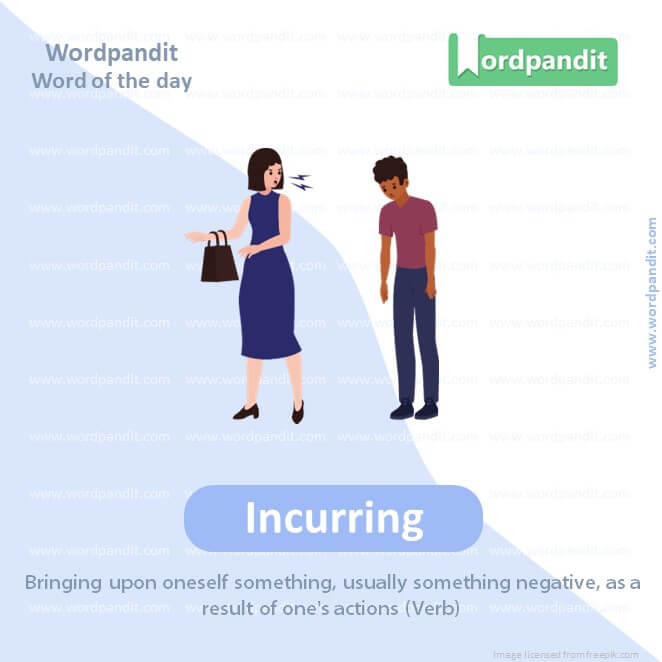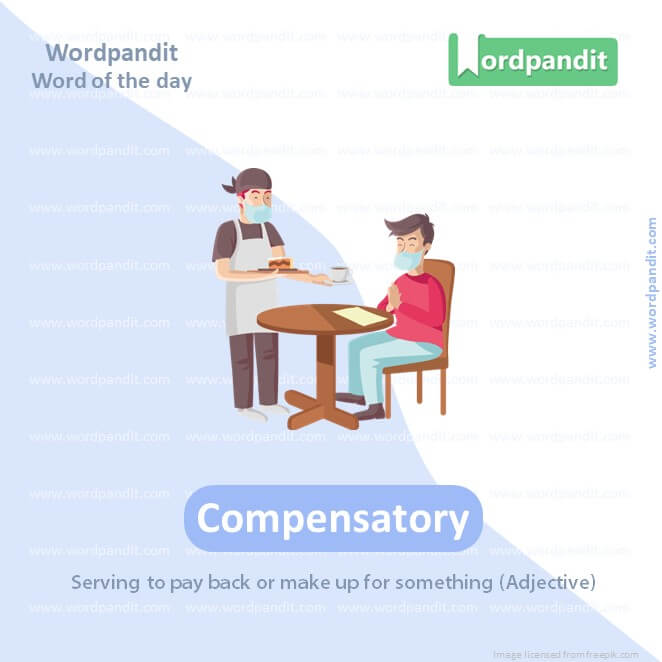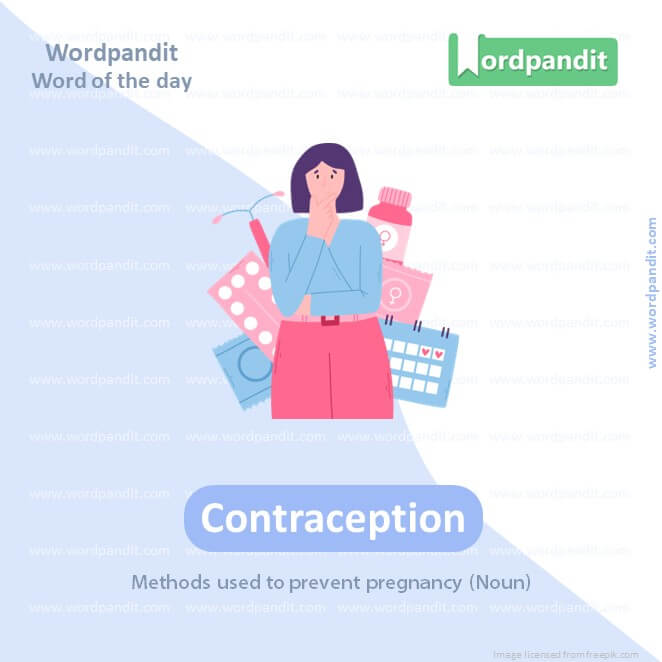Daily Vocabulary Words: List of Daily Used Words in Leading International Newspapers
Hi there. Welcome to this special section @ Wordpandit.
Our endeavour here is very simple: to highlight important daily vocabulary words, which you would come across in leading newspapers in the country. We have included the following newspapers in our selection:
• The New York Times
• The Washington Post
• Scientific American
• BBC
• The Guardian
• Psychology Today
• Wall Street Journal
• The Economist
We are putting in extensive work for developing your vocabulary. All you have got to do is be regular with this section and check out this post on a daily basis. This is your repository of words that are commonly used and essentially, we are posting a list of daily used words. Hence, this has significant practical application as it teaches you words that are used commonly in leading publications mentioned above.
Visit the website daily to learn words from leading international newspapers.

WORD-1: Incurring
CONTEXT: Those who learn English as a second language incur learning costs, while native speakers can communicate with all network members without incurring such costs.
SOURCE: Guardian
EXPLANATORY PARAGRAPH: Incurring is like getting something you might not want because of something you did. It’s like if you jump in a puddle and you end up getting wet.
MEANING: Bringing upon oneself something, usually something negative, as a result of one’s actions (Verb)
PRONUNCIATION: in-kur-ing
SYNONYMS: Acquiring, Suffering, Gaining, Attracting, Obtaining, Receiving
USAGE EXAMPLES:
1. He risked incurring his parents’ anger by staying out late.
2. Incurring debt can be risky for a small business.
3. She was worried about incurring more expenses.
4. By breaking the rules, he incurred a penalty.

WORD-2: Persuasive
CONTEXT: a person is more effective and persuasive when using their native language
SOURCE: Guardian
EXPLANATORY PARAGRAPH: Persuasive is like being really good at convincing people to do or believe something. It’s like when you talk your friend into sharing their toy with you.
MEANING: Good at convincing someone to do or believe something (Adjective)
PRONUNCIATION: per-sway-siv
SYNONYMS: Convincing, Influential, Effective, Compelling, Cogent, Strong
USAGE EXAMPLES:
1. Her argument was so persuasive that everyone agreed.
2. He gave a persuasive speech on environmental protection.
3. The advertisement was very persuasive in selling the product.
4. She used persuasive techniques to win the debate.

WORD-3: Compensatory
CONTEXT: However, some compensatory measures may help reduce global linguistic injustice.
SOURCE: Guardian
EXPLANATORY PARAGRAPH: Compensatory is like when you get something to make up for something else that was lost or not good. It’s like getting an extra cookie because you scraped your knee.
MEANING: Serving to pay back or make up for something (Adjective)
PRONUNCIATION: kom-pen-sa-tor-ee
SYNONYMS: Restorative, Reparative, Corrective, Recompensing, Redressive, Balancing
USAGE EXAMPLES:
1. The judge awarded compensatory damages in the lawsuit.
2. He took extra training as a compensatory measure.
3. The company offered a compensatory day off for working overtime.
4. Compensatory education programs help disadvantaged students.

WORD-4: Contraception
CONTEXT: This distils so much about the dynamic between doctors, pharma, patients and society in constructing the acceptable trade-offs of contraception.
SOURCE: Guardian
EXPLANATORY PARAGRAPH: Contraception is a way that grown-ups use to decide when they want to have a baby. It’s like having a special plan to make sure they have a baby only when they are ready.
MEANING: Methods used to prevent pregnancy (Noun)
PRONUNCIATION: kon-truh-sep-shun
SYNONYMS: Birth control, Family planning, Fertility control, Reproductive control, Pregnancy prevention
USAGE EXAMPLES:
1. They discussed different forms of contraception with the doctor.
2. Contraception is important for family planning.
3. She was educated about the importance of contraception.
4. Access to safe contraception is vital for health.

WORD-5: Ingenuity
CONTEXT: The calamity of unwanted pregnancy, which had beset the species since the dawn of time, had been solved, by raw ingenuity.
SOURCE: Guardian
EXPLANATORY PARAGRAPH: Ingenuity is like being very smart and creative, especially in figuring out new ways to solve problems. It’s like building a cool spaceship out of toy blocks.
MEANING: The quality of being clever, inventive, and imaginative (Noun)
PRONUNCIATION: in-juh-noo-i-tee
SYNONYMS: Creativity, Inventiveness, Cleverness, Originality, Resourcefulness, Innovation
USAGE EXAMPLES:
1. Her ingenuity solved the complex problem.
2. The device was a product of pure ingenuity.
3. He showed great ingenuity in his approach.
4. The engineers’ ingenuity was evident in the design.
WORD-6: Paucity
CONTEXT: It reveals itself instead in TikTok content, where women decry the paucity of research into hormonal contraceptives.
SOURCE: Guardian
EXPLANATORY PARAGRAPH: Paucity is like having very little of something. It’s like when there are only a few cookies left in the jar.
MEANING: The presence of something in only small or insufficient quantities (Noun)
PRONUNCIATION: paw-si-tee
SYNONYMS: Scarcity, Shortage, Lack, Deficiency, Insufficiency, Dearth
USAGE EXAMPLES:
1. There is a paucity of evidence in this case.
2. The paucity of water in the region is a serious problem.
3. His book displays a paucity of original ideas.
4. The paucity of funds delayed the project.
WORD-7: Astonishment
CONTEXT: this newspaper his astonishment at getting booed by the women in the hall.
SOURCE: Guardian
EXPLANATORY PARAGRAPH: Astonishment is like being really, really surprised about something. It’s like seeing a magician pull a rabbit out of a hat.
MEANING: Great surprise or amazement (Noun)
PRONUNCIATION: uh-ston-ish-ment
SYNONYMS: Amazement, Surprise, Wonder, Shock, Bewilderment, Stupefaction
USAGE EXAMPLES:
1. She stared in astonishment as the magician performed the trick.
2. His announcement was met with astonishment by everyone.
3. They gasped in astonishment at the news.
4. The beauty of the landscape filled them with astonishment.
WORD-8: Fecklessness
CONTEXT: Perhaps this betrayed some impatience with the imputed fecklessness of men, but nevertheless, it also showed a high level of acceptance that the right people had the reins.
SOURCE: Guardian
EXPLANATORY PARAGRAPH: Fecklessness is when someone doesn’t care much about what they should do and doesn’t try very hard. It’s like not cleaning up your toys even when you know you should.
MEANING: The quality of lacking initiative or strength of character; irresponsibility (Noun)
PRONUNCIATION: fek-lus-ness
SYNONYMS: Irresponsibility, Ineffectiveness, Worthlessness, Incompetence, Uselessness, Carelessness
USAGE EXAMPLES:
1. His fecklessness at work led to many mistakes.
2. The project failed due to the team’s fecklessness.
3. She was frustrated by her brother’s fecklessness.
4. The fecklessness of his approach was evident.
WORD-9: Oestrogen
CONTEXT: It doesn’t surprise me at all that oestrogen was such an easy casualty in the battle against reproduction, while testosterone had to be preserved pending a better, less romantic candidate for intervention.
SOURCE: Guardian
EXPLANATORY PARAGRAPH: Oestrogen is a special kind of medicine that helps women’s bodies in different ways. It’s like a magic ingredient that helps them stay healthy.
MEANING: A hormone that plays a key role in female development and reproductive functions (Noun)
PRONUNCIATION: es-truh-jen
SYNONYMS: Hormone, Estrogen (US spelling), Female hormone, Estradiol, Estrone
USAGE EXAMPLES:
1. Oestrogen levels change during the menstrual cycle.
2. The doctor explained the role of oestrogen in the body.
3. She was prescribed oestrogen therapy.
4. Oestrogen imbalance can cause health issues.
WORD-10: Thriving
CONTEXT. Social media and femtech combined offer a thriving marketplace of ideas, but unfortunately, it’s perhaps the least well-regulated market in commercial history, and some of the advice is terrible.
SOURCE: Guardian
EXPLANATORY PARAGRAPH: Thriving is like growing really well and being very successful. It’s like a plant that gets lots of water and sun and grows big and strong.
MEANING: Flourishing and being successful (Adjective)
PRONUNCIATION: thrahy-ving
SYNONYMS: Flourishing, Prospering, Booming, Successful, Blooming, Thriving
USAGE EXAMPLES:
1. The business was thriving in the new market.
2. She created a thriving garden in her backyard.
3. The thriving community was a hub of activity.
4. His thriving career brought him much satisfaction.
Vocabulary Meaning and Examples
In the fascinating world of language learning, a method particularly impactful is learning ‘vocabulary meaning and examples’. Harnessing this dual approach of understanding words through definitions and relevant examples yields a sound vocabulary grasp. Let’s explore how we can effectively learn vocabulary using ‘meaning and examples’.
Foremost, recognizing ‘meaning and examples’ involves more than just a surface glance at the definition. It requires an engaged interaction with the word, placing it within a proper context. This enriches comprehension and facilitates an innate understanding of the word’s applications.
The process of learning ‘meaning and examples’ is made highly effective through varied resources. Reading literature, online articles, and language learning platforms offer numerous examples enriching the meanings. By frequently encountering a word in various contexts, the understanding of the ‘meaning and examples’ deepens, imprinting the word into long-term memory.
When learning ‘meaning and examples’, creating personal sentences is recommended. Develop your own examples using the given word. This personal connection between learned vocabulary and your everyday life context strengthens both familiarity and recall.
Moreover, taking notes while studying ‘meaning and examples’ goes a long way in mastering vocabulary. Jotting down the definition and a couple of examples for reference leads to better recall during revisions.
Finally, teach to learn. A tried-and-true method to solidify ‘meaning and examples’ is by explaining the word to someone else. This exercise forces you to articulate the word’s usage and understanding clearly, embedding it further in your memory.
In conclusion, the journey to learn ‘vocabulary meaning and examples’ is a rewarding process that involves a multifaceted approach. As you dive into the rich experience of understanding words through ‘meaning and examples’, you uncover the nuance and depth of language, enabling you to master it in its true sense.











